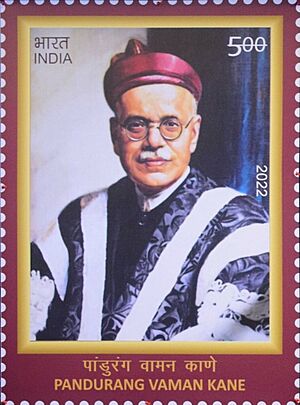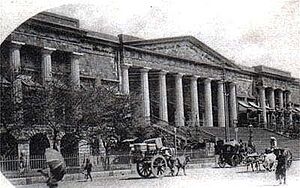Pandurang Vaman Kane facts for kids
Quick facts for kids
Mahamahopadhyaya
Pandurang Vaman Kane
|
|
|---|---|
|
पांडुरंग वामन काणे
|
|
 |
|
| Member of Parliament, Rajya Sabha (Nominated) |
|
| In office 16 November 1953 – 2 April 1964 |
|
| Preceded by | Alladi Krishnaswamy Iyer |
| Constituency | Presidential Nominee |
| Vice Chancellor of the University of Bombay | |
| In office 10 November 1947 – 9 November 1949 |
|
| Preceded by | M. C. Chagla |
| Succeeded by | Natwarlal H. Bhagwati |
| Personal details | |
| Born | 7 May 1880 Ratnagiri district, Maharashtra |
| Died | 18 April 1972 (aged 91) |
| Alma mater | University of Mumbai |
| Awards | Sahitya Akademi Award (1956) Bharat Ratna (1963) |
Pandurang Vaman Kane (kɑːnɛ-_-kaanay; Marathi: पांडुरंग वामन काणे; 7 May 1880 – 18 April 1972) was a very important Indian scholar. He was a historian, a lawyer, and an expert in Sanskrit, an ancient Indian language. He was also an Indologist, meaning he studied the history, languages, and cultures of India.
In 1963, he received the Bharat Ratna, which is India's highest award for civilians. This shows how much he contributed to the country. Kane worked for over 40 years in academics. He was even the head (Vice-Chancellor) of the University of Mumbai from 1947 to 1949.
He is most famous for his huge work, History of Dharmaśāstra. This is a five-volume book series about law and customs in ancient and medieval India. It took him many years to complete. From 1953 to 1964, he was also a member of the Rajya Sabha, which is one of the two main houses of the Indian Parliament.
Kane first studied and taught Sanskrit. Later, he got law degrees and worked as a lawyer. He taught Sanskrit at Wilson College and Elphinstone College. He also taught law at Government Law College. He was a member of the Bombay Asiatic Society.
The historian Ram Sharan Sharma said that Kane's work, History of the Dharmasastra, is like an encyclopedia. It helps us understand the old social laws and customs of India.
Contents
Early Life and Education
Pandurang Vaman Kane was born on May 7, 1880. His birthplace was Pedem, near Chiplun in the Ratnagiri district of what was then called the Bombay Presidency. His family had a history of being priests. However, his father, Vamanrao Kane, was a lawyer.
His father taught him about astrology and Sanskrit. He made young Pandurang memorize the Amarakosha, which is a famous Sanskrit dictionary. Kane went to school and finished his high school exams in Dapoli.
Kane then went to Wilson College. He earned his first degree, a Bachelor of Arts (B.A.), in 1901. He won a prize for his Sanskrit studies. He continued his studies at Wilson College and got his Master of Arts (M.A.) degree in English and Sanskrit by 1903.
For a short time, he worked as a school teacher. He taught at Government High School in Ratnagiri and Elphinstone High School in Bombay. In 1909, he became a professor of Sanskrit at Elphinstone College.
His Amazing Work: History of Dharmaśāstra
Dr. Kane is most famous for his huge book series, History of Dharmaśāstra. This work has five volumes and talks about law in ancient and medieval India. Dharmaśāstra refers to old Sanskrit texts that explain laws and proper conduct. Kane's book is an English summary of these important texts.
The first part of History of Dharmaśāstra was finished by Kane and published in 1930. It was published by the Bhandarkar Oriental Research Institute in Pune. The last part of the fifth volume was published in 1962. The entire series is very long, with about 6,500 pages. It gives a complete and detailed look at the religious and civil laws of old India.
Kane started writing an introduction for another book, Vyavaharamayukha. This introduction grew and grew until it became the massive History of Dharmaśāstra. He always said that it was hard to find a single English word for "Dharma." Across English, Sanskrit, and Marathi, Kane wrote nearly 15,000 pages!
He also wrote another important book called History of Poetics. Besides theology and poetry, he wrote about many other things. These included astrology, the cultural and geographical history of India, the Marathi language, and even mathematics. He has 198 publications in his name. These include 39 texts, 115 articles, and 44 books.
Awards and Recognition
Dr. Kane was given the title Mahamahopadhyaya. This means "The greatest among the great teachers." It was often shortened to "MM" before his name. He also served as the Vice-Chancellor of the University of Mumbai. His knowledge was so valued that he helped set up Kurukshetra University for studies in Indian culture.
In 1956, he won the Sahitya Akademi Award. This was for his research in the fourth volume of History of Dharmaśāstra. He was also an honorary member of the Bharatiya Vidya Bhavan.
Because of his great work in academics, he was chosen to be a member of the Rajya Sabha. This is a high honor for someone who is not a politician. The biggest award he received was the Bharat Ratna in 1963.
To honor him, the Asiatic Society of Mumbai released a special stamp in his name. This stamp was released on April 18, 2022.
Kane's Views on Indian Law
Kane believed that the Constitution of India was very different from older Indian ideas. He thought it made people feel they had only rights, but not enough duties or obligations.
Because his work was so detailed and respected, it is often used in discussions about Indian society and law. For example, during the government of Atal Bihari Vajpayee, there was a debate about whether ancient Indians ate beef. Both sides used Kane's writings to support their arguments. This was important because many Hindus respect cows and do not eat beef.
Another discussion was about whether girls in ancient times could wear the yajnopavita (sacred thread). In more recent times, this ceremony was mostly for men. Kane's work helped people understand the historical practices.
Legacy
To remember Dr. Kane, the Asiatic Society of Mumbai created the Mm. Dr. P.V. Kane Institute in 1974. This institute helps and encourages research in Indian studies. Also, the MM Dr. P.V. Kane Gold Medal is given every three years. It honors a scholar who has made outstanding contributions to the study of ancient Indian texts and literature.
See also
Other sources
- S.G. Moghe (editor), Professor Kane's contribution to Dharmasastra literature, 1997, New Delhi: D.K. Printworld (P) Ltd. ISBN: 81-246-0075-9
- Autobiographical Epilogue in History of Dharmashastra Vol 5
 | Lonnie Johnson |
 | Granville Woods |
 | Lewis Howard Latimer |
 | James West |


